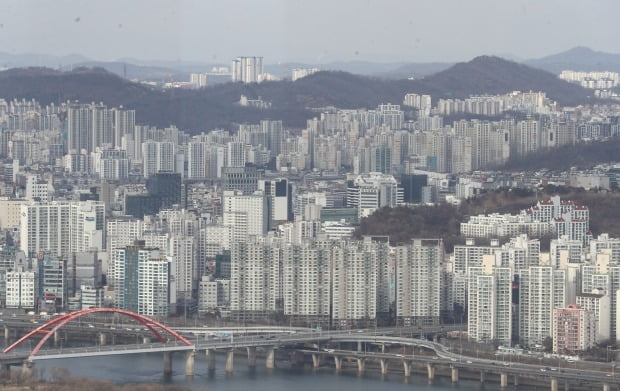
A view of apartments in downtown Seoul from the 63 Building in Yeouido, Seoul. /yunhap news
Since the beginning of the year, the government has been strengthening its commitment to’catching house prices’. One of the decisive reasons for the decline in the Moon Jae-in government’s approval rating in public opinion polls at the end of the year and the beginning of the year was the unrest in the real estate market.
Deputy Prime Minister Hong Nam-ki and Minister of Strategy and Finance, the government’s economic command tower, pledged to devote all their capabilities to the stability of the real estate market from the beginning of the year, and Minister of Land, Infrastructure and Transport Byeon Chang-heum also pledged to relieve the public’s worries by stabilizing the market.
“Must have real estate stability”
Deputy Prime Minister Hong said at the opening ceremony on the 4th, “From the beginning of the year, we must put all our policy competencies into place to ensure that the real estate market is stabilized.” Deputy Prime Minister Hong cited real estate, household debt, trade issues, and population issues as risk factors that could emerge unexpectedly this year, and among them, the real estate issue was reinforced in the policy will.

Hong Nam-ki Deputy Prime Minister of Economy and Minister of Strategy and Finance. /News 1
Minister of Land, Infrastructure and Transport Byun Chang-heum also emphasized the stability of the real estate market in his New Year’s speech. Minister Byeon said, “There are a lot of tasks ahead of us this year, including relieving the people’s anxiety over house price worries and problems with jeon or rent.”
Even Kim Dae-ji, head of the National Tax Service, helped. Commissioner Kim stressed that “this year, we must thoroughly respond to anomalous evasion by strengthening verification of the source of real estate acquisition funds and debt repayment.”
Various demands for real estate policy are also emerging in passports. In addition, Democratic Party Supreme Commissioner Roh Ung-rae appeared on a radio broadcast on December 31 of last year, saying, “It is difficult to give a score of 50 or more. According to a poll, 70% said that there is a problem with real estate.” As a result, it was possible to supply 150,000 units per year if high-density development is carried out in Seoul.
Ryu Si-min, chairman of Roh Moo Hyun-dan, a pro-fessional commentator, said that the real estate-related tax was too loose and ordered taxation to be strengthened. He appeared on a YouTube broadcast on the 1st and said, “It is reasonable to tax all income, but at a higher rate on unearned income,” he said. “There are many points out that it is too loosely taxed than income tax.”
Disguise Officer Supply Measures +α
The government’s distress is deepening as political pressure that stability in the real estate market is essential in order to hold by-elections for Seoul and Busan by-election to the justification that it is necessary to secure the price of a house that runs for the stability of the common people’s housing.
With the 24 real estate measures that have been introduced so far, almost all policies such as tax and finance have been announced, but house prices are not easily stabilized. According to the KB housing price trend time series statistics, the nationwide apartment sale price rose 0.28% in the last week of last December. The rate of increase in national jeonse prices was still high at 0.29%.
Inside and outside the real estate market, the government’s movement was closely watched, saying that if the market is unstable, something else could come out, as it is necessary to hold the rein of overheated house prices and jeon and monthly rent in order to hold the by-election of the Mayor of Busan and the Mayor of Seoul in April. have.

Minister of Land, Infrastructure and Transport Byun Chang-heum. /yunhap news
First of all, the currently announced plan is the urban supply plan that Minister Byeon announced at the inauguration ceremony on December 29 last year. Minister Byeon said, “In order to overcome the unrest in the housing market and restore public trust, we must provide customized housing wherever the people want it and at a desired level at a speed,” he said. He said he would announce measures before the Lunar New Year (February 12).
Minister Byun has emphasized high-density development plans for low-rise residential areas such as station area, semi-industrial areas, coalition and multi-family districts through personnel hearings. The plan is to provide unconventional incentives such as floor area ratio and deregulation of urban planning, but to redeem development profits through public development and secure public leases.
However, some opposition parties and some of the market demand the abandonment or major surgery of existing government policies such as the leasing law, urban reconstruction regulations, and lending restraints, but it is unlikely that the government will be able to touch the policy stance that contains the regime’s philosophy. A government official said, “At this time, we are not reviewing any special measures other than the supply countermeasures announced by the Minister of Land, Infrastructure, and Transport. However, it is possible to further strengthen the supply side and supplement the necessary parts of the existing countermeasures.” said.
Ahn Hye-won, Hankyung.com reporter [email protected]
